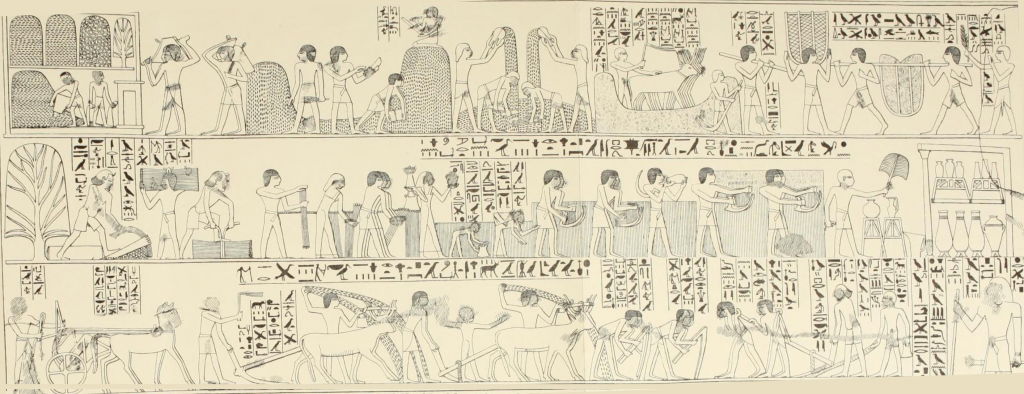Agriculture in Ancient Egypt
About the Poems
The poems may represent antiphonal (a type of responsive speech between two groups) songs among the workers. For example, stanza 4 in “Plowing and Sowing” seems to reply to an exclamation in stanza 3 by one of those breaking up clods. Again, those pulling a plow in stanza 6 answer Paheri’s imperative in stanza 5. Stanza 2 in “Reaping” is a retort by a youth to what is shouted in stanza 1 by the old man who tears seeds off the flax with a comb. In “Threshing” stanza 2 the basket carriers appear to respond to stanza 1, where the overseer addresses them.
We may regard this overseer as comparable with middle management opposite his subordinate employees. By contrast Paheri is the chief executive, hyperbolically called noble and prince in the first poem below. Paheri continues to conduct business among members of the afterlife the same as he had done earlier among those upon the surface of the earth.
The three poems or songs have been decoded from the hieroglyphics appearing in the images. Below each image the reading of the symbols are in the left column and an English rendering appears in the right column.
Plowing and Sowing

Listen to the poem in Ancient Egyptian
Listen to the poem in English
hru nefer, tutu qebu, na en ‘ahu her ‘ath, ta pet her ‘art en ‘ab-en, bak-en en pa ser
as-tu, pa h`ati, kherp na en ‘ahu, mek pa h`a `ah`a her peter
khenems as-tu em baku, tche-ek uh`a-en er nu nefer
‘au-‘a er ‘art hau her baku en pa ser geru
uza ‘an ha paheri maa kheru er atep na en usekhu em ta sekhet: djetch-ef en na en ‘ahutiu, as-ten, ta aht petet-t’a, kher pa hapaa urt
djetch-sen ‘ary-en, mek-en; em ‘ar sentch her ta aht, si nefert’a urt
neferui peru en re-ek pay-‘a sher’a; renpet
nefert shut em setchebu, senbet semu neb;
kher na en behesu nefer er khet nebt
A fine day, one is cool, the oxen are drawing, the heaven is doing according to our hearts, let us work for the noble!
Hasten, leader, forward with the oxen! behold the prince is standing and looking on.
Friend, hasten at the work, let us finish in good time.
I shall do more than the work due to the noble: be silent.
The prince Paheri, deceased, proceeds to load the barges in the river-meadow: he says to the farm-laborers, “Hasten ye, the corn fields are broken up: the Nile was very great”.
Say, “We are doing so, behold us; fear not for the corn-fields, they are very good”.
Twice excellent is your exclamation, my son!
the year is good, free of ills; healthy in all
herbs; and the calves are excellent beyond anything.
Reaping

Listen to the poem in Ancient Egyptian
Listen to the poem in English
‘ar ‘an-ek n’a 11009 nuk se-khem-‘a set
as-tu em ‘ar `asha-re, pa `aa as en ‘ahutiu
khen en usheb, djetch-sen hru pen nefer per em ta, ta mehyt pert’a, ta pet her ‘art en ‘ab en, bak-en mert ‘ab-en
‘amem n’a u`at tchet, mek ‘a-en em mesheru; em ‘ar na en kehesu en sef, ger em pa heru
If you bring me 11009 [sheaves], I am the man to strip them all.
Quick, do not chatter, you old quack of a laborer.
In answering chant they say, “This is a good day, come out onto the land”, “the north wind has come out”, “the sky is doing according to our heart”, “let us work and bind firm our heart”. Give me a hand; behold we shall come in the evening, do not repeat the meanness of yesterday, cease it today.
Threshing

Listen to the poem in Ancient Egyptian
Listen to the poem in English
‘as-ten, meh retchui-ten, pa mu ‘au, peh-ef na en qen’au
‘au pa shu shemu, tche-tu en pa shu sunt ‘at em remu
en ursh pa neb’a her remen-‘a retchui? su ‘ab- ‘a
he-ten en-ten (sep senu), ‘ahu, he-ten en-ten, he-ten en-ten; tcheha er ‘am, ‘at en nebu-ten; em ertche urtch en ‘ab-ten: tutu qeb
Hasten ye, quicken your feet: the water is coming, and will soon reach the baskets.
The sun is hot, may the sun be given fish in payment for the corn.
Does not the pole stay all day on my shoulder very firmly? That is my wish.
Thresh for yourselves, thresh for yourselves, oxen: thresh for yourselves, thresh for yourselves: straw to eat, corn for your masters: let not your hearts be still: it is cool.
Historical Information

AGRICULTURAL OPERATIONS
These scenes and hieroglyphic inscriptions date to circa 1400 BCE–during ancient Egypt’s 18th Dynasty. They depict a scribe Paheri inspecting agriculture in the nome (a type of territorial district in ancient Egypt) which he ruled south of Luxor. They are found on the south end of the west wall in the main chamber of his tomb.
Sources
Transliteration [simplified] and translation from J. J. Tylor and F. L. Griffith, The Tomb of Paheri at El Kab (London: Egypt Exploration Fund, 1894), pp. 13-15.
Curated by Edwin Hostetter, Department of Religion, George Washington University
